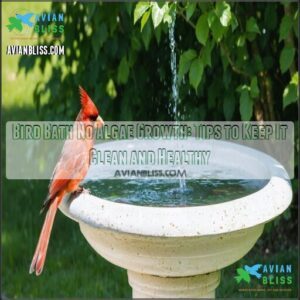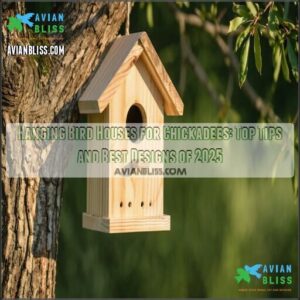This site is supported by our readers. We may earn a commission, at no cost to you, if you purchase through links.
Yes, hummingbirds do eat bugs! These tiny birds have a big appetite for insects, which might surprise those who only picture them sipping nectar from flowers.
Insects are an important source of protein and other nutrients that help hummingbirds develop strong muscles and grow new feathers. They’re like little pest controllers, snacking on mosquitoes and gnats.
But they also enjoy a variety of other bugs, from small beetles to spiders and wasps. It’s a bug buffet for these energetic birds!
Read on to discover the fascinating details of a hummingbird’s diet and how you can attract these winged wonders to your garden with the right insect offerings, creating a hummingbird-friendly environment.
Table Of Contents
- Key Takeaways
- Hummingbirds Eat Insects
- Do Hummingbirds Eat Bugs
- Hummingbird Feeding Habits
- Hummingbird Diet Variety
- Hummingbird Nutrition Needs
- Attracting Hummingbirds With Insects
- Frequently Asked Questions (FAQs)
- Why put aluminum foil around a hummingbird feeder?
- Do hummingbirds keep mosquitoes away?
- What is a hummingbird’s favorite food?
- What is the most common predator of a hummingbird?
- Do hummingbirds eat bugs?
- Do Baby hummingbirds eat insects?
- How many insects do hummingbirds eat a day?
- Do hummingbirds eat mosquitoes?
- What do hummingbirds eat?
- Do hummingbirds rely on insects?
- Conclusion
Key Takeaways
- Hummingbirds eat bugs, and quite a variety—from gnats and mosquitoes to spiders and beetles.
- Insects provide essential protein and nutrients that support their high-energy lifestyle and metabolic rate.
- These birds are skilled hunters, employing clever techniques to catch their tiny prey.
- You can attract hummingbirds to your garden by creating a bug-friendly environment and offering an insect-rich diet.
Hummingbirds Eat Insects
Hummingbirds rely on insects as a essential source of protein and nutrients.
Hummingbirds are bug-eating machines, keeping the skies clear of pesky insects.
You might be surprised to learn that these tiny birds have a big appetite for bugs, and they use clever hunting techniques to catch their prey.
Types of Insects Consumed
Hummingbirds are bug-eating birds, and their insectivorous diet includes a variety of insects.
These tiny birds feast on spiders, ants, aphids, fruit flies, gnats, beetles, and mosquitoes. They’re picky eaters, favoring specific beetle and fly species.
These bug-catching birds have unique techniques for capturing their prey, ensuring a diverse and nutritious diet. So, regarding hummingbirds and bugs, it’s a match made in heaven for these energetic birds.
Hummingbirds also rely on arthropod food sources to supplement their nectar intake.
Importance of Insects in Diet
While nectar provides the energy, insects are the power source.
They’re the secret to hummingbirds’ high-octane lifestyle.
These tiny birds need insects for protein and essential nutrients like amino acids, vitamins, and minerals.
This is especially true during breeding season when nestlings rely on insects for nutrients not found in nectar.
So, when you see a hummingbird zipping by, remember it’s a bug-eating machine, keeping the skies clear of pesky insects.
Hunting Techniques for Insects
Hummingbirds are master hunters, employing a range of hunting techniques to capture their tiny prey.
They use:
- Gleaning methods, picking insects off leaves and trees with precision.
- Hawking techniques, snatching bugs like gnats and fruit flies mid-flight.
- Sharp eyesight and tongue mechanics to detect and capture insects in rapid, imperceptible movements.
Hummingbirds primarily consume insects and spiders as part of their native insect diet, which can be found at native insect diet, and they play a crucial role in their ecosystem with their unique hunting abilities.
Do Hummingbirds Eat Bugs
Yes, hummingbirds do eat bugs, and quite a variety of them! These tiny birds have a big appetite for insects, which provide essential protein and nutrients.
It might surprise you to learn that hummingbirds are bug-eating birds, but it’s true—they’re not just nectar lovers. From gnats and aphids to fruit flies and spiders, these birds have a diverse insect diet.
They’re skilled hunters, too, with unique adaptations for capturing their tiny prey. So, while they may be known for their love of sweet nectar, don’t be fooled—hummingbirds are just as fond of bugs. This bug attraction is an important part of their diet and survival strategy.
Now, let’s explore the fascinating world of hummingbird bug-eating habits and the role insects play in their daily lives.
Hummingbird Feeding Habits
Hummingbirds are busy, hungry birds with unique feeding habits. They eat frequently, consuming tiny meals of nectar and insects throughout the day to fuel their high-energy lifestyle.

Frequency of Eating
These bug-eating birds have quite the appetite! Hummingbirds eat about half their body weight in sugar daily, snacking as often as every ten minutes.
In an eight-hour period, that’s up to 48 tiny meals. Talk about a busy beak!
This frequent feeding is essential to their survival, as they need a constant energy supply to fuel their active lifestyle.
So, if you’re wondering about the eating patterns of these tiny birds, now you know—they’re always on the lookout for their next meal, which is crucial for their overall energy supply.
Amount of Food Consumed
So, how much do these tiny birds actually eat? Well, it turns out that hummingbirds eat a lot—we’re talking a lot—for their size.
- Hummingbirds eat between 3 and 7.5 calories a day.
- That’s like a human eating 155,000 calories daily!
- They need this energy to keep up with their fast-paced lives.
Now that’s what I call a power diet! Let’s pivot to understanding the role of nectar and insects in their diet.
Role of Nectar and Insects
Nectar and insects are both essential to a hummingbird’s diet and survival.
While nectar provides the majority of their energy needs, it’s the insects that supply the protein, vitamins, and minerals they require.
Together, these two food sources give hummingbirds the nutrient balance they need to stay healthy.
This sugar intake from nectar, along with their skilled insect capture abilities, helps these tiny birds stay energized for their active lifestyles.
Understanding hummingbird predators is vital for creating a safe environment that supports their well-being.
Hummingbird Diet Variety
Hummingbirds have diverse diets, and their food choices vary depending on the season and where they live.
You’ll be surprised to learn that these tiny birds consume a variety of insects, and we’ll reveal the top seven bugs that hummingbirds love to eat, including the fact that they have diverse diets.
Arthropods as Primary Food Source
Hummingbirds are bug-eating birds, and arthropods are a key part of their diet.
These tiny birds are skilled hunters, using their agility to capture a variety of insects:
- Gnats
- Aphids
- Mosquitoes
- Fruit flies
- Spiders
Hummingbirds eat bugs to supplement the nectar they drink, ensuring they get enough protein and other essential nutrients.
Seasonal Variations in Diet
The hummingbird diet varies with the seasons, and their food sources depend on the time of year.
In summer, hummingbirds feast on nectar-rich flowers, while in winter, they rely on tree sap and insects.
Migration also influences their diet, as they need energy for their journey, and these birds are highly adaptable, adjusting their foraging behavior to find the best food sources.
This flexibility guarantees they get the nutrition they need throughout the year, and understanding their bird eating habits change is vital for providing the right support during different seasons, which is a key consideration.
Geographical Differences in Diet
The hummingbird insect diet varies depending on their geographical location.
Regional food sources and habitat variance play a role in what insects hummingbirds consume.
Climate impact and migration patterns also influence dietary adaptation. For example, tropical hummingbirds may rely more on insects than those in temperate regions.
Hence, understanding the unique ecological dynamics of each region is key to grasping the insect consumption patterns of hummingbirds.
Hummingbird Nutrition Needs
To keep these tiny birds healthy and happy, it’s important to understand their nutritional requirements.
This includes knowing what they eat and why, as well as how you can support their dietary needs.
High Metabolism and Energy Requirements
These tiny birds have unique energy needs.
Hummingbirds require a constant fuel supply due to their high metabolic rate.
Here are some key facts about their caloric intake and nutrient uptake:
- Hummingbirds eat frequently, consuming 3 to 7.5 calories daily.
- That’s like a human eating 155,000 calories!
- They get energy from nectar and protein from insects.
- Water is essential, but they don’t drink much standing water.
- Migration and breeding seasons affect diet choices.
Understanding their protein needs requirements is essential for their overall health and well-being.
Importance of Protein and Vitamins
Protein and vitamins are essential for hummingbird health, and these bug-eating birds get their fill from an insect-rich diet.
While nectar provides energy, protein sources from insects are necessary for growth and reproduction.
A diverse insect diet guarantees adequate nutrient balance, meeting their vitamin needs.
If you’re wondering about dietary supplements, hummingbirds eat enough bugs to meet their energy requirements and protein needs naturally.
Role of Water in Hummingbird Diet
While sugar-rich nectar fuels hummingbirds, water is essential for their survival.
Here’s how water plays a vital role in a hummingbird’s diet:
- Water Intake: Hummingbirds get most of their water from the nectar they consume, but it’s not enough to meet all their needs.
- Hummingbird Hydration: These birds also drink water from other sources, ensuring they stay hydrated, especially in hot weather.
- Nectar Water: Nectar provides some water, but it’s not a reliable source, as it can vary depending on the flower and the time of day.
- Daily Water: Access to standing water is important, but they usually drink small amounts, so a shallow birdbath or water feature is ideal.
Attracting Hummingbirds With Insects
Creating a bug buffet is an effective way to attract hummingbirds to your garden.
You can entice these tiny birds by offering a variety of insects and creating a bug-friendly environment, which we’ll explore in this section.
Creating a Bug-Friendly Environment
Creating a bug-friendly environment is key to attracting these bug-eating birds.
You can offer an insect-rich diet by planting native plants that lure a variety of insects. Consider bug-friendly plant products to enhance your garden.
Create pollinator zones in your garden to support wildlife habitats. Enhance your green space with bug gardens and insect feeders.
Soon, you’ll have bug-eating birds flocking to your yard. Identify insects with field guides for attracting hummingbirds.
Offering Mealworms and Other Insects
Mealworms are a great treat for hummingbirds, offering protein and other nutrients. Their nutritional value makes them a great supplement to a hummingbird’s diet.
You can buy mealworm feeders or simply scatter them on a platform feeder. Consider buying mealworms for hummingbirds online.
Maintain a steady supply of insects by purchasing from pet stores or raising your own. Offer them a few times a week, along with the insects they catch naturally. Mealworms are a safe choice.
Tips for Feeding Hummingbirds Insects
If you’re looking to feed hummingbirds an insect-rich diet, consider these tips:
Emphasize natural food sources by adding native plants to your garden, attracting the insects they love. Avoid pesticides, which can harm hummingbirds and deplete their food sources.
Place feeders in shaded areas to prevent spoilage, and provide fruit fly traps near feeders to offer an additional food source. Supplemental feeding with hummingbird mealworms is a great option, too.
Frequently Asked Questions (FAQs)
Why put aluminum foil around a hummingbird feeder?
Shimmering in the sunlight, aluminum foil around your hummingbird feeder helps deter ants and other insects.
It’s also believed to attract more hummingbirds with its reflective properties that catch their attention.
Do hummingbirds keep mosquitoes away?
Yes, hummingbirds help control mosquito populations.
They’ll eat mosquitoes during their insect-hunting activities, though they don’t specifically target them.
Their insect consumption is a nice bonus to their beautiful presence in your garden.
What is a hummingbird’s favorite food?
While some believe hummingbirds only drink nectar, their favorite food is actually a combination of flower nectar and small insects.
You’ll find them drinking sugar-rich nectar for energy and eating bugs for protein.
What is the most common predator of a hummingbird?
Cats, both domestic and feral, are your hummingbird’s greatest threat.
They’ll silently stalk these tiny birds at feeders.
Other predators include hawks, owls, praying mantises, and larger aggressive birds like jays.
Do hummingbirds eat bugs?
Hummingbirds definitely eat bugs as an essential protein source in their diet.
They’ll catch insects mid-air or pluck them from leaves, consuming aphids, mosquitoes, gnats, and fruit flies to complement their nectar intake.
Do Baby hummingbirds eat insects?
Baby hummingbirds rely heavily on insects for protein.
You’ll find parent birds feeding their nestlings regurgitated insects rather than nectar, as the protein supports proper growth and development of their tiny bodies.
How many insects do hummingbirds eat a day?
Like tiny warriors in a constant battle against hunger, hummingbirds consume hundreds of insects daily.
You’ll find these aerial acrobats eating up to several hundred fruit flies and other small bugs to meet their protein requirements.
They are aerial acrobats that play a vital role in the ecosystem.
Do hummingbirds eat mosquitoes?
Yes, you’ll find hummingbirds consuming mosquitoes regularly as part of their protein intake.
They catch these pesky insects mid-air through hawking or pluck them from surfaces, supplementing their nectar diet with essential nutrients.
What do hummingbirds eat?
You are what you eat, and hummingbirds consume both nectar and insects.
They’ll drink nectar from flowers for energy and catch small insects like gnats, aphids, and mosquitoes for protein and essential nutrients.
Do hummingbirds rely on insects?
Hummingbirds absolutely rely on insects for protein and essential nutrients.
They’ll catch bugs mid-air or pick them off leaves, consuming hundreds daily.
Without this protein source, they couldn’t grow, reproduce, or maintain their incredibly active metabolism.
Conclusion
Picture your garden buzzing with both hummingbirds and beneficial insects—a perfect symbiotic relationship.
Now that you know hummingbirds eat bugs as an essential protein source, you can create an environment that supports their complete dietary needs.
By reducing pesticides and planting insect-friendly flowers, you’ll attract these tiny aerial acrobats naturally.
Remember, a healthy ecosystem includes both nectar sources and the insects hummingbirds crave. Your garden can become their favorite dining spot with just a few thoughtful adjustments.
- https://www.birdwatchingdaily.com/beginners/birding-faq/do-hummingbirds-eat-bugs/
- https://choosenatives.org/articles/how-to-feed-hummingbird-part-i-insects-protein/
- https://www.reddit.com/r/hummingbirds/comments/146shr7/do_humming_birds_eat_bugs/
- https://ucanr.edu/blogs/blogcore/postdetail.cfm?postnum=29582
- https://www.allaboutbirds.org/news/not-all-sweetness-and-light-the-real-diet-of-hummingbirds/



